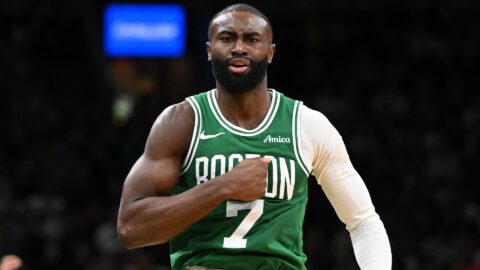The New England Patriots might never have had a running back more talented than Curtis Martin. They certainly never had one who was more productive.
Despite playing just three seasons in New England, from 1995 to 1997, Martin remains the franchise’s fourth-leading rusher. He was responsible for three of the Patriots’ 10 best single-season rushing performances, including a 1,487-yard rookie campaign that ranks second in franchise history.
So why did Martin’s Patriots tenure end so soon after it began? The same reason most players change teams mid-career: money.
When Martin hit free agency for the first time following the 1997 season, New England offered him a six-year, $12 million contract.
“We had our statistical gurus tell us that we should be cautious because he was injured in college (and) he had some injuries playing for us,” Patriots owner Robert Kraft explained in “A Football Life: Curtis Martin,” which is set to premiere Friday night on NFL Network.
But as a 24-year-old two-time Pro Bowl pick whose career still was on the upswing, Martin did not believe that offer coincided with his value to the Patriots, especially when the team’s quarterback was making nearly four times that.
“I remember just a year before, Drew Bledsoe had signed a contract for six years, $42 million,” Martin said in the documentary. “And his signing bonus was $12 million. I just felt like I was worth more than Drew Bledsoe’s signing bonus.”
Because Martin was a restricted free agent, the Patriots had the ability to match any team’s contract offer. But one team found a loophole: the AFC East rival New York Jets, coached at the time by old friend Bill Parcells.
Parcells, who’d coached Martin for his first two seasons in New England and served as a father figure to the young back, offered him a deal that, because of salary cap restrictions, the Patriots were unable to match. Known as a “poison pill” contract, it paid Martin $36 million over six years and helped shift the balance of power in the AFC East.
“We tried to do something that was in the rules but would make it difficult for New England to match the contract,” Parcells said in the documentary.
The Patriots received the Jets’ first- and third-round selections in the 1998 NFL Draft as compensation, but it did little to ease the sting of losing arguably their best offensive player. And while the arrival of Bill Belichick and Tom Brady a few years later turned New England into the dynasty it is today, Kraft still wonders what could have been had Martin not taken his talents elsewhere.
“I always believed he would retire as a Patriot,” Kraft said. “It’s like seeing a girl you were in love with or had a big crush on dating some other guy.”
For Martin, who helped lead the Jets to the AFC Championship Game in his first season with the team, the decision between $12 million and $36 million was a no-brainer. If the Patriots had offered him a more lucrative deal from the start, who knows how the rest of his career would have played out?
But he says he completely understood — and even respected — Kraft’s decision to move in a different direction.
“I think I may have been the closest player to Mr. Kraft in the friendship that we had,” Martin said. “Most people would look at (the contract offer) and get offended. It made me admire him even more, because I recognized how he was able to separate the personal from the business.”
Martin played eight highly productive seasons in New York, gaining more than 1,200 yards on the ground in six of them and leading the NFL in rushing as a 31-year-old in 2004. He retired one season later and was inducted into the Pro Football Hall of Fame in 2012.
“A Football Life: Curtis Martin” premieres at 9 p.m. ET Friday on NFL Network.
Thumbnail photo via Kirby Lee/USA TODAY Sports Images




